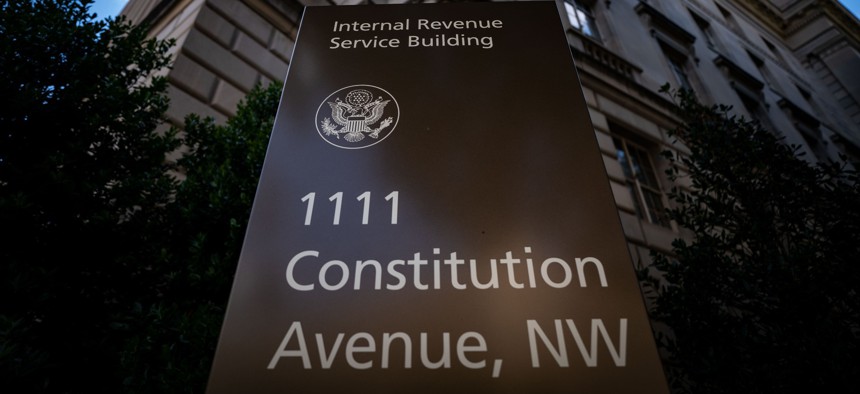Code for America tests digital access to a key tax benefit

Kent Nishimura / Los Angeles Times via Getty Images
Low-income workers are leaving more than $7 billion in tax benefits on the table every year. Will an online tool help increase earned income tax credit participation?
The nonprofit Code for America is adding new functionality to its existing simplified tax filing tool, getCTC.org, to help low- and middle-income workers claim the earned income tax credit.
The tool was originally launched in fall of 2021 to help low-income Americans submit simplified returns with the minimum information needed to get the child tax credit and stimulus payments, as opposed to full tax returns.
Now, the nonprofit is adding a new set of steps to ask people that are potentially eligible for the earned income tax credit (EITC) if they want to claim it and walking them through that process. It will be open through Nov. 15.
The effort to use the existing simplified tax filing tool for the earned income tax credit is an experiment, said David Newville, senior program director of Get Your Refund at Code for America.
The EITC process includes W-2 forms from employers – an income verification step not required under the advance CTC payments.
"It's a little more complicated," said Newville. "We know that some folks will not be able to pull these documents and access [the earned income tax credit] through getCTC.org. But we're hoping that some will, and we'll be able to learn from that."
The move is the latest iteration of ongoing tax work for the nonprofit that's aiming to expand access to cash benefits that are delivered through the tax code.
In 2021, the average amount of the earned income tax credit was $2,411. But according to 2018 data, around 22% of taxpayers don't claim the benefit. That's around $7 billion a year, according to data in a 2018 Treasury Inspector General for Tax Administration report.
"The problem," said Newville, is that "taxes are very complicated."
Historically, to get the benefit, you have to file your taxes, even if you're not required to file a tax return otherwise.
A September 2022 study by the Bipartisan Policy Center found that confusion about qualifications and lack of access to easy, online tools contribute to lack of uptake for the earned income tax credit and the child tax credit, as well as fear of IRS audits and language barriers.
A big part of the Code for America's strategy for increasing uptake is making things that are easy to use.
The nonprofit touts the fact that the getCTC.org website is mobile-friendly and offered in English and Spanish in plain language. The first iteration of getCTC.org ran for 10 weeks during fall 2021 and was used by 115,451 households to get around $440 million in benefits, according to Code for America.
"I think for us, it's always been kind of trying to show what's possible, and trying to demonstrate different best practices for doing this," he said. "I think we really accomplished showing that a simplified filing process could work."
The nonprofit says it will be tracking what happens when it adds income reporting to the tool, like whether and where people get stuck, potentially to make the argument that the IRS itself needs to make changes to automate the process to make it more simple on the front end.
"If clients do struggle with their W-2s, it will underscore what we have argued before: that, in order to increase filing rates, the IRS should use the data they already have to calculate the EITC amount on behalf of W-2-only taxpayers with low incomes," reads a Code for America blog released Wednesday. "This would be true simplified filing for the nation's largest anti-poverty program."
The nonprofit is doing the work "in collaboration" with the Treasury and White House, it says (language the Treasury Department has also used), but doesn't have a formal contract, Newville said. The nonprofit has been certified as an e-file provider by the IRS, he said.
FCW asked the IRS for comment on the nature of the relationship and was referred to the Treasury Department, which did not respond for comment by publication time.
The IRS itself is grappling with the future of the program meant to offer free tax filing options for Americans, called the Free File program. It's run by the IRS with a consortium of tax prep companies.
But most eligible Americans use other means to file their taxes, and some heavy-hitters like Intuit, which runs TurboTax, have left the program in recent years.
The agency seems to have taken a stance against operating its own public, free-filing option, although the Democrat's recently-passed Inflation Reduction Act requires the agency to study the cost and feasibility of such a program anyways.
"Who knows if the IRS will go down that route, but I think for us, a big thing is … trying to show the IRS if you decide to do this, this is how it could be possible," said Newville. "And here are some best practices to make sure that low-income people are able to access the system and aren't left out of whatever they design."
NEXT STORY: Treasury Fines Crypto Mixer on Money Laundering



